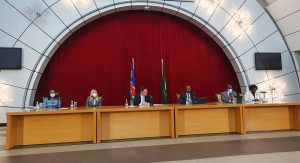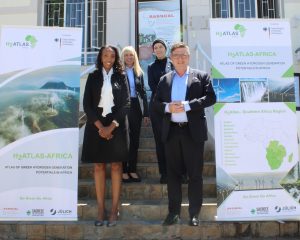The Green Hydrogen Innovation Commissioner at the German Federal Ministry of Education and Research (BMBF), Dr. Stefan Kaufmann visited Namibia from 24 – 26 February 2022. The purpose of the visit was to advance the implementation of the Joint Communiqué of Intent (JCoI) signed between Namibia and Germany on cooperation in the field of energy and green hydrogen resources. During his visit Dr Kaufmann held meetings with the German Ambassador and South Africa High Commissioner, among other high-level stakeholders. As the focus, Dr Kaufmann had extensive discussions with the Namibia Green Hydrogen Council, and other representatives involved in energy and green hydrogen resources on the next step to bring the JCoI to life. Dr Kaufmann was accompanied by Dr. Kerstin Zimmermann (head of International relations, BMBF) & Ms. Kerstin Annassi Ms. Kerstin Annassi (Head of Basic Research Energy Systems of Projektträger Jülich).
“We are witnessing a major change: fossil sources such as oil and gas are being replaced by renewable energies. Green hydrogen has the chance to become the oil and gas of the future. It is a game-changer,” said Dr Kaufman
At the launch of Namibia / Germany Green Hydrogen Projects funded by the BMBF under the JCoI, a press conference was held on Friday, 25 February 2022 at the state house. The main aim of the press conference was to launch the programmes under the implementation of the JCoI, i.e., The Scholarship programme (Youth for Green Hydrogen-Namibia (Y4H2)), Pilot projects and the Green Hydrogen Strategy.
The panel for the press conference was constituted by the Namibian Green Hydrogen Council Chairperson, Director General Obeth Kandjoze, the German Green Hydrogen Innovation commissioner, Dr Stefan Kaufmann, the Minister of Higher Education, Training and Innovation, Dr Itah Kandjii-Murangi, The Presidential Economic Advisor and Green Hydrogen commissioner, James Mnyupe, the Executive Director of the Southern African Science Centre for Climate Change and Adaptive Land Management (SASSCAL), Dr Jane Olwoch and Dr Kerstin Zimmermann.

Pictured during the press conference: Director General Obeth Kandjoze, Dr Stefan Kaufmann, Dr Itah Kandjii- Murangi, Mr James Mnyupe, Dr Jane Olwoch and Dr. Kerstin Zimmermann
During his speech, Dr Kaufmann reiterated that there are many opportunities for cooperation and shared future between Namibia and Germany in the green hydrogen economy. As a first step in advancing green hydrogen development in Southern Africa, Dr Kaufmann visited Namibia and South Africa in November 2020 and is now finalizing the action of the Renewable Energy and Green Hydrogen project in Namibia. The purpose of his visit was to identify key stakeholders in Namibia that are strategically positioned to deliver the renewable energy and green hydrogen project in SADC.
“The world market for green hydrogen and its derivatives such as ammonia and methanol will emerge, and all this may happen much faster than many people expect. Green hydrogen will then be able to be produced at the same cost as fossil or blue hydrogen. This could be achieved already within the next two or three years,” Dr Kaufmann stated.
Furthermore, higher education minister Itah Kandjii-Murangi said the scholarships will advance Namibian’s skills for a range of different interests to support the green hydrogen and renewable industries.
“Scholarships will be open to everyone, even those currently employed, I urge all to partake this opportunity,” Dr Itah Kandjii-Murangi
Dr Kaufmann also made reference to the H2 Atlas Africa. He mentioned that the H2Atlas is a data-based assessment of the potential of green hydrogen production in sub-Saharan Africa using renewable energy resources in the region. It has assessed the availability and suitability of land and water resources while taking into account other aspects like land and water uses. The project will also evaluate the potential of green hydrogen utilization in these African region as well as the possibility of its export. “The preliminary results for Namibia are quite promising with its gigantic potential for wind and solar energy. Namibia is an excellent starting position; the country can become a global player for green hydrogen production,” he added.

Pictured during his visit at the SASSCAL Regional Secretariat: Dr Stefan Kaufmann, Dr Jane Olwoch
Dr Kerstin Zimmermann and Ms. Kerstin Annassi
Dr Kauffman also engaged the members of the Strategy and Technical Working Groups and held key discussions around the calls for the different programmes. The Technical Working group is a forum for matters of common interest in relation to the programmes and projects arising from JCoI. During the meeting Dr Kauffman highlighted the importance of a green economy, and establishing a whole value chain on Green hydrogen.

Pictured during the Technical Working Group meeting: Dr Stefan Kaufmann, Mr James Mnyupe, Dr Jane Olwoch, Dr. Kerstin Zimmermann, Ms. Kerstin Annassi and Ms Cheroline Ripunda
German and Namibia enjoy close ties, with shared history but also look towards shared future. Dr Kaufmann emphasised on shaping this future together, and jointly advancing the establishment of a green hydrogen economy.
Dr Kaufmann further iterated that he is glad and very proud that BMBF was the first to formally establish a cooperation with Namibia in August 2020, and signed JCoI on energy and green hydrogen. It was an important step towards climate neutrality not only for the two countries but also in a global context. Dr Kaufmann acknowledged SASSCAL’s commitment towards the coordination of all activities related to the implementation of the agreement.
Dr Kaufmann also participated in a live TV interview with the Namibia Broadcasting Corporation and stated that “Our aim is to build a green hydrogen partnership between Germany & Namibia on knowledge sharing, focusing on Green hydrogen feasibility study, pilot project & scholarship programme for young Namibians”.
“The achievements realised so far in this agreement are the financial commitment of 40 million Euros to fund projects, develop technical and scientific work groups to work on the process of projects delivery, and to develop specific calls to implement the strategy. A project with this calibre is expected to realise benefits such as sustainable energy future for Namibia, new job creation for the youth, an economy based on new technologies and also benefits of transfer of knowledge between Germany and Namibia,” Dr Kaufmann remarked.
As the implementer of the JCoI between Namibia and Germany, SASSCAL has been accorded the privilege by BMBF to coordinate all renewable energy and green hydrogen projects in SADC and is in the process of concluding the Atlas of Green Hydrogen Generation Potential (https://www.h2atlas.de/en/) in SADC. The launch of the H2 Atlas is anticipated to be early in the year 2022. As the second phase unfolds, different projects will be implemented in selected SADC countries.




